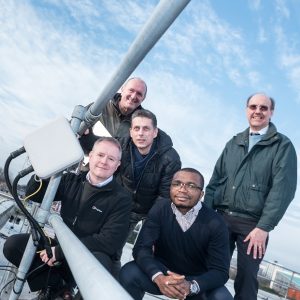
Telecommunications student Odum Rowani is conducting a leading-edge study of how weather affects mobile networks in partnership with top engineers from NEC, BT and EE.
Odum, who graduated in MSc Data Telecommunications Networks, is researching for his PhD on the effects of variations in global weather conditions on the quality of data transmission for mobile networks.
And he has the perfect test-bed for his work at the University of Salford after telecom giants NEC, BT and EE chose Salford as a research partner to test new 4G evolution and 5G related network technology.
Odum, who is from Nigeria, said: “A challenge for engineers is how to connect the evolved 4G and 5G cell sites back to the operators core network, and one solution is the use of V-band point to point radio systems.”
Much testing is still needed on the optimum deployment and robustness of ‘point-to-point’ transmissions which use radio millimetre wave frequencies in the 60GHz band; particular how they may stand up to the rigours of the British weather.
Using the University of Salford as a base, the NEC, BT and EE have created a research site to measure the performance of the V-band radio system over a 12-month period when exposed to rain, wind, fog and ice.
“This will be one of the most detailed tests of this type done anywhere in the world to date, so we are delighted it will be hosted in Salford with our partners NEC, EE and British Telecom,” explained Professor Nigel Linge, one of Odum’s professors.
“Millimetre wave point-to-point links operate at very high frequencies to transmit high volumes of data over relatively short distances. However, the high frequency does mean that it is possibly affected by climatic conditions – the question being by how much.”
The University has installed a radio system complete with transceivers and antennas on the Newton Science and Engineering building and the Maxwell Building at its Peel Park Campus and will monitor transmissions until early 2018.
Stephen Walthew, Manager – Transport Networks at NEC Europe, said Salford was a perfect choice for the testing: “We were looking for an urban area, somewhere the weather is very variable and where there is expertise in network engineering. Given our long-standing relationship with Professor Linge and his colleagues, we are delighted the University of Salford can host the tests.”
“The 60GHz connection has the opportunity to become the solution of choice for high capacity backhauling, so the more scientific evidence we can collect about its performance, the better we can make decisions about design and deployment.”